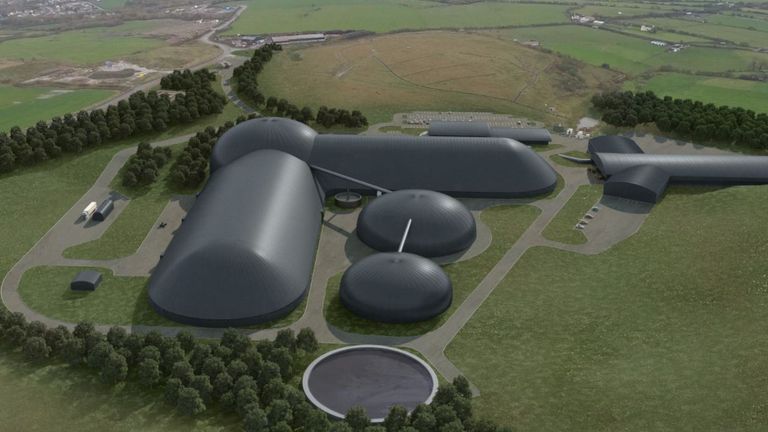The decision to approve the UK's first coal mine for 30 years has been thrown out by a High Court judge.
Today's ruling likely forces Angela Rayner, the Labour government's housing, communities and local government secretary, to reconsider the planning application for the Whitehaven coal mine - this time taking into account the full damage it could do to the climate.
Mr Justice Holgate said in his judgment: "The assumption that the proposed mine would not produce a net increase in greenhouse gas emissions, or would be a net zero mine, is legally flawed."
At a hearing in July, the newly elected government had already decided not to defend the previous Conservative administration's decision to greenlight the project, following new legal developments.
The future of the proposed mine is now uncertain.
Project developer West Cumbria Mining has not confirmed its next step, saying it will "consider the implications" of the High Court judgment.
It could choose to withdraw its application, or seek to appeal against the High Court's decision.

The ruling suggests a landmark case in June has paved the way for successful legal challenges against fossil fuel extraction projects in the UK.
In the June case, the UK's highest Supreme Court ruled that the environmental damage from burning coal, oil and gas must be taken into account when deciding whether to approve new fossil fuel projects.
Niall Toru, senior lawyer for Friends of the Earth, which helped bring the case, called it "a huge victory for our environment".
He said the ruling against the project "could have ramifications internationally", as there are cases abroad being challenged on similar grounds.
The Whitehaven mine application argues it would create up to 500 jobs and provide coking coal for the steel industry.
There were always questions about whether the coal was suitable for UK steelworks, and since then the UK market has declined, with Tata Steel this week moving ahead with plans to cut jobs and switch to greener methods.
Read more from Sky News:
Countryside 'won't be plastered with pylons'
Tsunami left Earth shaking for days
Keep up with all the latest news from the UK and around the world by following Sky News
Tap hereThe troubled history of the Whitehaven coal mine plans
Today's High Court decision is just the latest step in a dramatic saga.
Boris Johnson's government approved the coal mine in December 2022, not long after it had lobbied other countries to ditch coal when it hosted the COP26 climate summit in Glasgow.
It was the first new coal extraction project to be approved in the UK for 30 years, promising local jobs, but was condemned by top climate advisers.
Campaigners Friends of the Earth and South Lakes Action on Climate Change (SLACC) took the government to court over the decision, arguing it had failed to take into account the full climate impact of the mine.
The mine's future was thrown into further doubt this year when another fossil fuel project being challenged on similar grounds was shot down.
In June the Supreme Court ruled the Horse Hill oil site in Surrey had been approved unlawfully.
It said the assessment of its environmental damage should have taken into account the emissions from burning the fossil fuel, not just from extracting it.
Weeks later, the new Labour government dropped its defence of the coal mine, saying it had initially been approved due to an "error of law".
However, West Cumbria Mining still wanted to fight for the project and the court case went ahead.
This was the first similar case since the June ruling to test whether it had set a precedent.
The good news and bad news after momentous mine ruling
This decision could be the final nail in the coffin for the Whitehaven coal mine - depending on what West Cumbria Mining does next.
It could also be the death knell for other fossil fuel projects being challenged in UK courts, like the Rosebank and Jackdaw fields in the North Sea.
That's because it gives more weight to arguments by campaigners that the climate impact of such projects has not been properly factored in, or simply cannot be justified.
Is that good news or bad news?
It is bad news for those hoping for one of the few hundred local jobs promised: another blow to industrial, working class communities also suffering from the decline of steel-making and oil-refining.
New green industries - like heat pump installation or green hydrogen production - can offer alternative jobs with a longer lifespan.
But it's hard to get enough jobs, at the right time, in the right parts of the country to ease the pain from the loss of old industries, as shown in Port Talbot and Grangemouth.
In terms of energy security, this project is neither here nor there, as the coal was likely to be used abroad.
For other projects, their contribution to energy security depends on whether their oil or gas would be sold into the UK or exported.
Much tends to be exported, but the UK is still heavily reliant on oil and gas, for example in gas boilers that heat homes. But the UK has little oil and gas left in its fields anyway.
In terms of the economy, the loss of income to the Treasury from cancelled projects could be significant, though must be weighed against alternative green projects, and the cost of the impacts of climate change on the UK, like heavier flooding.
Today’s ruling is certainly good news for climate campaigners at home and abroad, and for the UK's 2030 climate target, which is in danger of slipping out of reach.
It's good news for the green credentials of the new government, too, as it pledged to end new fossil fuel projects.
It also helps the Labour government restore its global climate leadership position, enabling it to lobby other countries to step up.
But the British public will judge the government less on what it does abroad at remote climate summits, and more on how it manages the transition at home to a cleaner energy future.
Disclaimer: The copyright of this article belongs to the original author. Reposting this article is solely for the purpose of information dissemination and does not constitute any investment advice. If there is any infringement, please contact us immediately. We will make corrections or deletions as necessary. Thank you.



